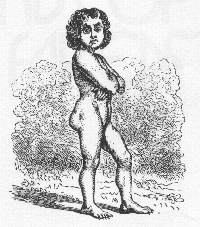Demonology: definitions
 "The
other shape,
"The
other shape,
If shape it might be call'd,
that shape had none,
Distinguishable in member, joint, or limb;
Or substance might be call'd
that shadow seem'd;
For each seem'd either; black it stood as night,
Fierce
as ten furies, terrible as Hell,
And shook a dreadful dart; what seem'd
his head
The likeness of a kingly crown had on.
Satan was now at
hand; and from his seat
The monster, moving onward, came as fast
With
horrid strides; Hell trembled as he strode."
-- John Milton
"A daemonibus docetur, de daemonibus docet, et ad daemones ducit"
(It is taught by the demons, it teaches about the demons, and it leads to the demons - Albertus Magnus)
De-mon-ol-o-gy: n- The study and classification of demons, and of beliefs about them. [fr. Gk. daimon, spirit + logos, discourse].
As the name sufficiently indicates, demonology is the science or doctrine concerning demons. Perhaps the first fact that strikes one who approaches the study of this subject is the astonishing universality and antiquity of demonology, of some belief in the existence of demons or evil spirits. The belief in spirits, both good and evil, is commonly associated with two widespread and primitive forms of religious worship (which have been recognized and accepted as such fairly lately, and to the Christian churches' dismay many people have decided to return to those practices). Accordingly some modern researchers ascribe the origin of demonology either to the personification of the forces of nature - in which many have found a "key to all the mythologies" - or else to Animism, or a belief in the powerful activity of the souls of the dead, who are invoked and worshipped. Based on this last theory is the viewpoint that all spirits were at first conceived of as being the souls of dead men, and from this aboriginal Animism there gradually developed the various elaborate systems of mythology, demonology, and angelology.
De-mon: n- Also spelled DAEMON, in religions worldwide, any of numerous malevolent spiritual beings, powers, or principles that mediate between the transcendent and temporal realms.
Note: The term "demon" was not always understood to have the absolutely negative connotation that it does today. Homer used the terms "demons" and "gods" more or less interchangeably. Another opinion was that demons were intermediaries between men and gods, and that demons had once been men. Plutarch speaks of "human souls as commencing, first heroes, then demons, and afterward as advancing to a more sublime degree." Philo of Byblus seems to draw on this same tradition when he states that, "The most ancient of the barbarians, especially the Phoenicians and Egyptians, from whom other people derived this custom, accounted those the greatest gods who had found out things most necessary and useful in life - and had been benefactors to mankind."
Our current use of the term "demon" is to denote a malignant spirit, and comes to us primarily form New Testament authors. However, there is still uncertainty as to whether or not demons are considered to be distinct and separate from the Devil and his fallen angels, at least as far as the Catholic church is concerned.
A demon is a spirit, nature spirit, or non-human intelligence that interacts with the material world and is concerned with the direction of lower plane activities. The term "demon" is derived ultimately from the Sanskrit root div ("to shine"), through the Greek daimon ("divine power"). To the Greeks daimones were intermediary spirits between humans and the Gods. In Western religion and occult lore, demons are classified into various elaborate systems, and hierarchies of hell, and have been ascribed various characters, forms, attributes and duties. The most complex hierarchy was devised by Johann Weyer, who estimated that there were 7,405,926 demons serving under seventy-two princes. In Christianity, demons are associated only with evil. They include those demons who were cast out of heaven together with Lucifer (a.k.a. the fallen angels), as well as pagan deities branded as demons by the church (remind me not to pass judgment...). Most of these demons devote themselves to tormenting human beings, assaulting them, sexually abusing them, and possessing them. The possibility of sex with demons was denied before the 12th century, but by the later Middle Ages belief in sexually voracious demons in alluring male or female form who preyed on sleeping men and women (see incubus, succubus) became widely accepted. In the sixteenth and seventeenth centuries in Europe witches were regularly accused of having sex with demons (besides having sex with the Devil). It was held that demons could be expelled or kept at bay by the ritual of exorcism, or by the use of certain prayers, or a special charm, or by wearing an amulet or talisman.
Demonic: Being as or resembling a demon.
Demoniac: A person possessed by demons.
Demonocracy: The demonic hierarchies, classes, governments.
Demonographer: One who studies and records the history and description of demons.
Demonography: The history and description of demons.
Demonolator/Demonolatress: One who practices demonolatry.
Demonolatry: The worship of demons and/or practicing sorcery/magic with the aid of entities known as demons.
Demonologist: One who studies and catalogues demons. Also known as a Demonographer.
Demonomancy: Divination by means of demons.
One cannot study demonology through the usual ways. The researcher must get hold of old books, grimoires and codexes and make her way through millions of contrasting data. Most of the knowledge we have today comes from mythology and legend, and when these two things are involved, things tend to get hazy. However, there are certain grimoires, mostly Cabbalistic ones, like the Keys of Solomon for example, that give somewhat detailed accounts regarding demons and their hierarchies. I have tried to gather here as much info as I can, and the effort is continuous. I hope you find my findings enlightening.
Black Vine (R)